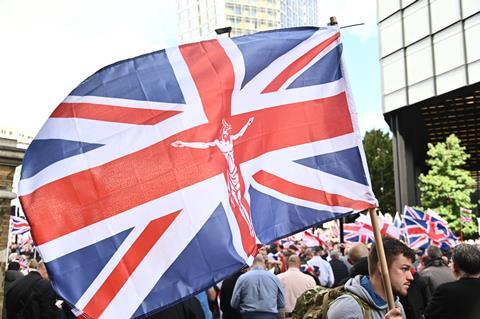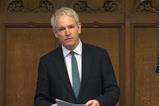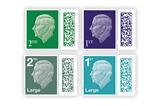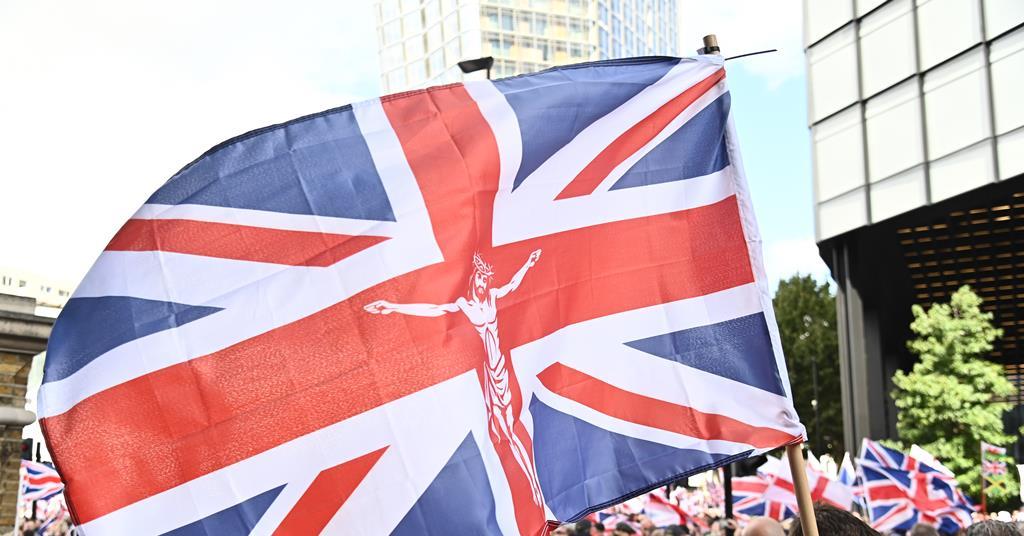Premier Christianity uses cookies Read our cookie policy.
By 2025-09-15T15:19:00+01:00
Reporting from inside the ‘Unite the Kingdom’ demonstration, David Campanale asked Christians why they were there. He explores what they said and asks whether a religious revolution is taking place
Source: Robin Pope/NurPhoto
Saturday’s Unite the Kingdom rally was attended by 110,000 people, according to the Metropolitan Police
By chance or providence, Tommy Robinson’s march fell on the same weekend that Christians were marking the Feast of the Exaltation of the Holy Cross.
Celebrated for generations, 14 September remembers the claimed discovery by Constantine’s mother Helena of the True Cross and the nails that crucified Christ in 326AD.
Fragments of the Cross were thereafter carried by Christian warriors into battle; with the hope they would bring divine favour. Are the warriors of the Christian Right in Britain expecting the same thing?
It could be said Christendom began when Constantine had a vision in Rome of a cross in the sky on the eve of the Battle of Milvian Bridge in 312 AD. He saw on it the inscription ”In hoc signo vinces” – “In this sign, you will conquer”. Across Britain since summer began, ‘Operation Raise the Colours’ has seen the flag of St George and the cross it bears appended to lampposts or daubed on roundabouts and walls. And this raising of the ‘sign that conquers’ came to its natural crescendo on Saturday.
As I walked with the Tommy Robinson crowd from Blackfriars Bridge through London’s Southbank, I was surrounded by people wearing Crusader outfits, carrying flags of St George, or waving Union flags. Welsh dragons and Scottish saltires were also prominent, as were flags with Bible verses such as ‘Jesus the Way, the Truth, the Life’, or ‘Jesus is Lord’ and ‘Turn back to God’.
A consistent theme emerged from these bearers of the cross. They told me they didn’t feel listened to, that the political system excluded and belittled their concerns and that the sense of national crisis is such that only a Christian revival can fill the void.
People on the march included Black protesters wearing Union colours, though they were only a handful. The chants I heard were not racist, nor Islamaphobic. They were either praising the organiser, “Oh, Tommy, Tommy…”, or directing obscenities at the Government, “Keir Starmer’s a w*****”.
The mood of the crowd was both anger at perceived political betrayal and despair that politics might ever be capable of delivering the change they want to see.
Stuart Connolly from Birmingham told me, “I think a lot of people are looking for something, and what they’re really looking for is Jesus Christ. That’s what they want when they’re patriotic and they long for another time in England. It’s basically Christian values when we could love one another and trust one another.”
Mary was from a house church in Liverpool. Her hope for the march was both spiritual and political, “The country needs more than just some values. They need an anchor, which is Jesus”, she said. But on the details of what this means, there were few.
“I think Jesus wants us to embody love above all”, Tom from Chelmsford told me. He then described the tolerance he hopes will be an outcome of the event. He wanted to see “Truth and loving each other and peace. And this is our country, and it’s being taken over.”
But he couldn’t describe who was doing the “taking over”, or what he wanted done about it.
When pressed, some people I interviewed in the crowd carrying Jesus flags said they were not Christians and would not be in church on Sunday. This included one young man who was parading a banner with Bible verses.
Another explained why he was carrying a pole with a flag with a Knights Templar cross on it. Though not a church goer, he told me, “It’s a Crusade cross. It represents the Crusaders who drove the Muslims and Islamists from Europe”. Asked whether he wanted to see the same happen in Britain, this modern-day Crusader replied, “Yes, 100%.” And added, “We need our country back, and we need to keep getting back to what it was, say, in the 1950s when men were men, and they all went to work.”
He spoke in terms clearer than the actual Christians did. He wanted deportations of illegals (Donald Trump style) and millions removed. I asked how these people might be identified, if they no longer had documents. His answer was to use blood tests.
It was at this point that I heard a cry, “He’s a leftie” from behind and a series of expletives from men demanding I stop recording. I protested, “But this is a free-speech rally!” Their reply came with punches thrown. I was pushed and then chased by two men through the crowd. The antagonists were drunk, and more likely to fall over, than me being pushed over.
All this reminded me of a warning given by Christian MP and Conservative, Nick Timothy, after the assassination of Charlie Kirk, “When words are said to be violent, violence becomes the response to words.” What we’ve seen in recent days from the political Left is there on the Right too, except covered over at this moment by a religious veneer of prayers, St George’s flags and Bible verses.
I walked away unhurt and at pace. But in Westminster, police were injured when confrontations between Robinson supporters and Stand Up To Racism protestors turned violent at Trafalgar Square.
There was a praise and worship band on the main platform, featuring Pastor Rikki Doolan (who was once caught on camera by an Al-Jazeera investigation offering to help launder dirty money), while a cleric in bishop’s garb led the assembled mass of humanity in the Lord’s Prayer.
Elon Musk called for the dissolution of Parliament and claimed “massive uncontrolled migration” was contributing to the “destruction of Britain” in comments via video link. He also told the crowd that “violence is coming” and that “you either fight back or you die”.
Musk’s disturbing themes were mirrored by some of the Christian speakers from the platform. Their rhetoric was incendiary, even though others sincerely said they felt the event was spiritually uplifting.
Brian Tamaki of Destiny church, New Zealand led a team of Maori dancers with the hakka, before his team shredded flags marked ‘Muslim Brotherhood’, ‘Secular humanism’, Islamic State and Palestine.
The pentecostal preacher told the crowd, “This is a religious war. It’s Jesus Christ versus Satan. Christianity versus the rest. Islam, Hinduism, Bahai, Buddhism, and whatever else you’re into, are all false religions. We’ve got to clean our countries up. We got to get everything out that does not know or receive Jesus Christ. Ban any type of public expression in our Christian nations from other religions. Ban halal, ban burkas, ban mosques, ban temples, ban shrines. We don’t want those in our countries.”
Tamaki was cheered.
This wasn’t a vision of “Come one, come all”, the title of the Christian authored official theme tune for a rally meant to ‘Unite the Kingdom’. A better song title might have been, ‘Come one, come all, come ready for a fight’.
Tommy Robinson also picked up on the Christian messaging, telling the crowd, “There has been a globalist revolution. They have attacked the family. They’ve attacked Christianity. They’ve opened the borders. They’ve flooded our nations. We are the start of a counter revolution”.
He was followed by far-right and nationalist politicians from across Europe, including an AFD MP from Germany, the cancelled Romanian presidential candidate George Simion, who urged respect for “God, faith, family, homeland.” Dutch Catholic Eva Vlaardingerbroek spoke, as did representatives of extreme Belgian party Vlaams Belang, the Danish People’s Party and Polish MEP from Law and Justice, Dominik Tarczyński, who used to work at Westminster’s Catholic cathedral.
My favourite moment mixing the offensive with the absurdity of a comedy sketch came from fourth-placed French presidential far-right candidate, Eric Zemmour. Telling the crowd “I have come here to London to convey to you the admiring greetings of the French”, he added with a Pythonesque mistranslation, “I am happy to be among you. So many of you today. I am proud to be among this English people who are revolting.”
Is this a revolution? Are the English people going to stage a revolt and if so, will it be the violence of forced deportations? What is to be made of the flags mixed with faith, actual fascist politicians being given a stage by Robinson and the failures of mainstream parties to address these concerns?
The answers can’t be found without looking at Tommy Robinson. He says he was part of a weekly 45 minute Bible study when serving time in prison, led by what he has described as a “lovely Asian pastor”. He told podcaster Liam Tuffs, “I’ve gone through the Bible. And as I went through it, I realised everything is from the Bible. Every saying, everything, every part of what our country has been built has come from the Bible. And when did this country start to fall? When did it decay? When it lost its faith and identity.”
If he studies closer, he will see the Bible shows that the way of the cross is not one of power, but of powerlessness and that Jesus “emptied himself and became obedient to the point of death – even death on a cross.” (Philippians 2:6)


Grab this Deal!
We’re celebrating a remarkable journey from our humble beginnings as Buzz in the 1960s to the vibrant, multi-platform publication we are today. One thing has remained constant: our commitment to connecting faith with the world around us. To celebrate our birthday, we are offering you a Print and Digital subscription for just £24 your first 12 months!
Subscribe Today
*Offer applies in UK only, but check here for our overseas offers
2025-09-19T15:17:00Z
Some of Charlie Kirk’s opinions seemed incongruous with those of the saviour he followed, says Richard Reddie
2025-11-07T11:38:00Z
JD Vance has been criticised for expressing his hope that his wife Usha will convert to Christianity. But Mo Tizzard, who has navigated faith differences in her own marriage says desiring your spouse’s salvation isn’t offensive – it’s the most loving thing you can want for them
2025-11-06T09:10:00Z
Michael Toms was convicted on nine counts including rape and indecent assault of two girls. Having attended the sentencing hearing, Susie Leafe says his case reveals the same troubling dynamics of abuse seen across other church denominations
2025-10-28T15:33:00Z
With 2,000 churches warning they may close within the next five years, heritage professionals and church leaders gathered at the Victoria and Albert Museum to confront the crisis facing Britain’s churches. AJ Gomez went along to find out their plan to address what some are calling a “national emergency”
2025-10-21T09:02:00Z
Is this the long-predicted schism? Divisions over sexuality have long plagued the Anglican Communion, but according to some commentators, a full separation is now taking place. Tim Wyatt takes a closer look at Gafcon’s latest statement, which includes the revelation this group of churches will elect their own chair to replace the Archbishop of Canterbury
2025-10-07T08:26:00Z
At the recent Labour Party conference, Keir Starmer announced plans to introduce a digital ID card. Ostensibly touted as a solution to the UK’s current immigration crisis, some Christians wonder if it’s linked to end times prophecy. Chris Follett explains
Site powered by Webvision Cloud

